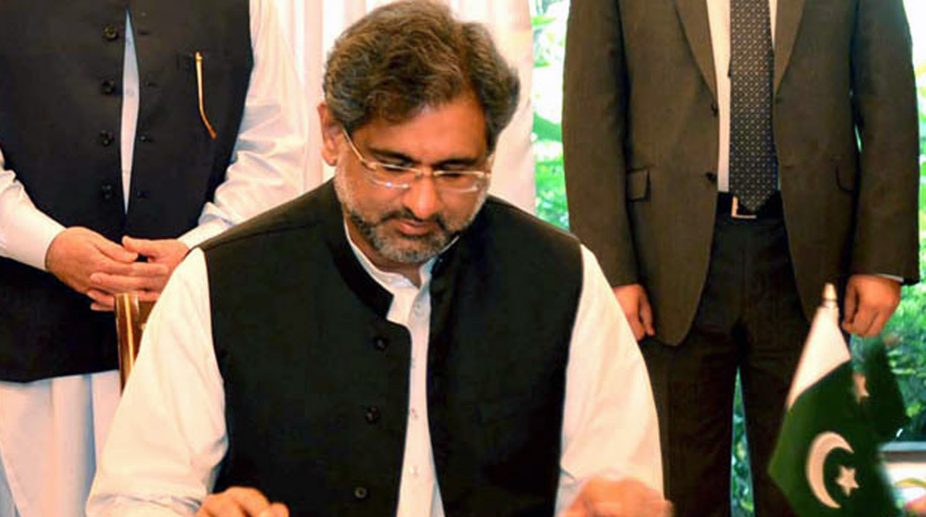Pakistan Prime Minister Shahid Khaqan Abbasi warned on Thursday of the possibility of a “dangerous escalation” on the subcontinent and clamoured for intervention by the global organisation, while delivering what is likely the most virulent attack on India at the UN General Assembly in recent times.
Accusing New Delhi of frequently violating the ceasefire along the Line of Control (LoC) in Kashmir, he said that “if India does venture across the LoC, or acts upon its doctrine of ‘limited’ war against Pakistan, it will evoke a strong and matching response”.
“The international community must act decisively to prevent the situation from a dangerous escalation,” he said.
Abbasi also admitted that Pakistan’s nuclear arsenal is directed against India.
“Confronted by a hostile and increasingly militarized neighbour, Pakistan has been obliged to maintain the capability for credible deterrence,” he said. “Our strategic assets are vital to deter oft-threatened aggression.”
Pakistan has refused to accept a “no-first-use” policy for nuclear weapons, leaving its options open for striking first.
Abbasi spent almost a third of his General Assembly address of about 12 minutes attacking India.
The Pakistani leader accused India of committing “war crimes” and violating the Geneva Conventions through the use of pellet guns by its forces leading to the blinding of its victims.
United Nations Secretary-General Antonio Guterres and High Commissioner for Human Rights Zeid Ra’ad Al Hussein should send an inquiry Commission to the Indian state of Kashmir to look into India’s human rights violations and “secure the punishment of those responsible”, he said.
Guterres should also appoint a Special Envoy on Kashmir whose “mandate should flow from the longstanding but unimplemented resolutions of the Security Council” on Kashmir, he said.
India considers the Security Council resolutions unenforceable because Pakistan refused to withdraw its troops from the parts of Kashmir it occupied as required by them.
And Kashmiris have made their option to be a part of India clear by their participation in democratic elections, India maintains.
After Prime Ministers Indira Gandhi and Zulfikar Ali Bhutto signed the 1972 Simla Agreement recognising that disputes between the two countries are bilateral matters, India has said that there can be no third party intervention.
“As in the past, today the Kashmiri people are waging a heroic and popular struggle to rid themselves of India’s oppressive rule” Abbasi said.
“India has responded with massive and indiscriminate force to suppress the Kashmiris, shooting indiscriminately at children, women and youth,” he said. “Hundreds of innocent Kashmiris have been killed or injured.”
He reiterated that Pakistan was “open to resuming a comprehensive dialogue with India to address all outstanding issues, especially Kashmir” and it “must be accompanied by an end to India’s campaign of subversion and state sponsored terrorism against Pakistan, including from across our western border.”
The mention of “western border” appeared to be a reference to Kulbhushan Jadhav, a former Indian Navy officer who Pakistan says entered Balochistan from Iran last year. He has been sentenced to death by a military court in Pakistan on spying charges. India has denied he was working for it and has asked the International Court of Justice to intervene.
Abbasi spoke of a strong response if India went across the LoC. Last year in September India carried out what it called a surgical strike inside Pakistan-administered Kashmir against terrorists who had attacked a military post in Uri. Islamabad denied the raid had taken place.
The Pakistani attacks on India over Kashmir have failed to get get any notice among the members of the UN.
None of the 112 other countries that have spoken so far in the annual high-level General Assembly debate has even mentioned the Kashmir issue, and last year none other than Pakistan did during the entire session.
Earlier on Thursday, Abbasi met Secretary-General Antonio Guterres. Pakistani media reported that he handed over to Guterres a dossier of “Indian atrocities in Kashmir”.











